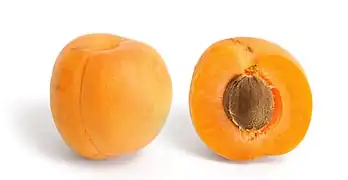| Apricot | |
|---|---|
| Hex triplet | #FBCEB1 |
| sRGBB (r, g, b) | (251, 206, 177) |
| HSV (h, s, v) | (24°, 29%, 98%) |
| CIELChuv (L, C, h) | (86, 40, 41°) |
| Source | Maerz and Paul[1] |
| ISCC–NBS descriptor | Pale orange yellow |
| B: Normalized to [0–255] (byte) | |
Apricot is a light yellowish-orangish color that is similar to the color of apricots. However, it is paler than actual apricots.
Etymology

The etymology of the color apricot (and the fruit): the word comes from the Arabic Al-birquq (itself from Greek berikokon, ultimately from Latin praecoquum). Apricot has been in use as a color name since 1851.[2]
Variations of apricot
Light apricot
| Apricot (Crayola) | |
|---|---|
| Hex triplet | #FDD5B1 |
| sRGBB (r, g, b) | (253, 213, 177) |
| HSV (h, s, v) | (28°, 30%, 99%) |
| CIELChuv (L, C, h) | (88, 41, 48°) |
| Source | Crayola |
| ISCC–NBS descriptor | Pale orange yellow |
| B: Normalized to [0–255] (byte) | |
Displayed at right is the light tone of apricot called apricot since 1958 in Crayola crayons.
Mellow apricot
| Mellow apricot | |
|---|---|
| Hex triplet | #F8B878 |
| sRGBB (r, g, b) | (248, 184, 120) |
| HSV (h, s, v) | (30°, 52%, 97%) |
| CIELChuv (L, C, h) | (79, 69, 46°) |
| Source | BS 5252 |
| ISCC–NBS descriptor | Moderate orange yellow |
| B: Normalized to [0–255] (byte) | |
Displayed at right is the color mellow apricot.
This is one of the colors on the British Standards 5252 color list. This color is #06E50 on the 5252 color list. The 5252 color list is for colors used in color coordination and in building construction. The British Standard color lists were first formulated in 1930 and reached their present form in 1955.
Apricot in human culture
- Sexuality
- In the bandana code of the gay leather subculture, wearing an apricot bandana means that one is a chubby chaser if worn on the right, and a chub if worn on the left.[3][4][5]
See also
References
- ↑ The color displayed in the color box above matches the color called apricot in the 1930 book by Maerz and Paul A Dictionary of Color New York:1930 McGraw-Hill; the color apricot is displayed on page 43, Plate 10, Color Sample 7F.
- ↑ Maerz and Paul A Dictionary of Color New York: 1930—McGraw-Hill. See page 189 for year of first recorded use of color name reference and page 43, Plate 10 Color Sample 7F for color sample of Apricot.
- ↑ Andrews, Vincent (2010), The Leatherboy Handbook, The Nazca Plains Corp., ISBN 978-1-61098-046-3
- ↑ Hankycode on gaycitiusa.com Archived 2007-12-06 at the Wayback Machine access date 2012-03-30
- ↑ Hankycode on leathernjonline.com access date 2010-03-30
